Colonia
Author: Dirk Henn
Publisher: Queen Games
Year: 2009
review by

| x |
|
|
|
|
|
|
|
|
|
|
|
|
|
|
|
|
|
|
|
|
|
|
|
|
|
|
|
|
|
|
|
|
|
|
|
|
|
|
|
|
|
|
|
|
|
|
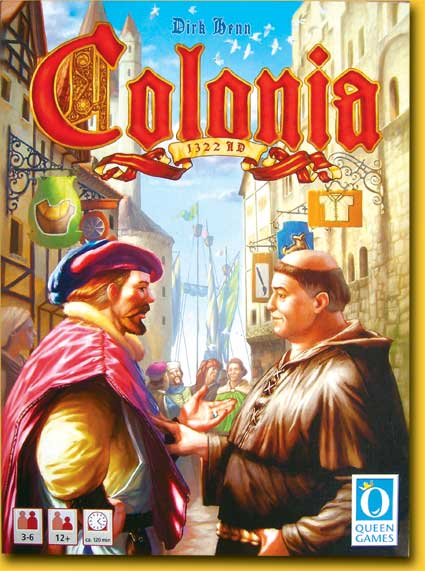 |
Dear folks, do not listen to this modern crap: capitalism isn’t dead and will not die in a long time. The best evidence for this can be found in the achieved results in the past, in Cologne during the Middle Ages for instance, where rich families strive to get somewhat richer than they already are. This works rather nice, although they need to exercise some efforts. As a player we work on a temporary assignment, and we are allowed to make the important decisions for a week or six on behalf of the family. Can we perform as good as they do? |
|
| x |
|
|
|
|
|
|
|
|
|
|
|
|
|
|
|
|
|
|
|
|
|
|
|
|
|
|
|
|
|
|
|
|
|
|
|
|
|
|
|
|
|
|
|
|
|
|
| On a large (large!) game board the activities of the week are clenched, from monday laundry day to the sunday church-attendance; the usual seven days a week in total. These days are worked per round, where monday is a kind of an organizing day to prepare the new week. But on Tuesday things are going to be done: in the city council the hierarchy is determined; in player language this more commonly is called the player order. On Wednesday resources are bought on the market, that the labourers on Tuesday without much further ado are converted into products, as these have to beshipped the following day, Friday. Saturday is pay day, and on Sunday the acquired money is used to buy all sorts of relics. After the sixth week the value of these relics determines the most succesfull family. |
|
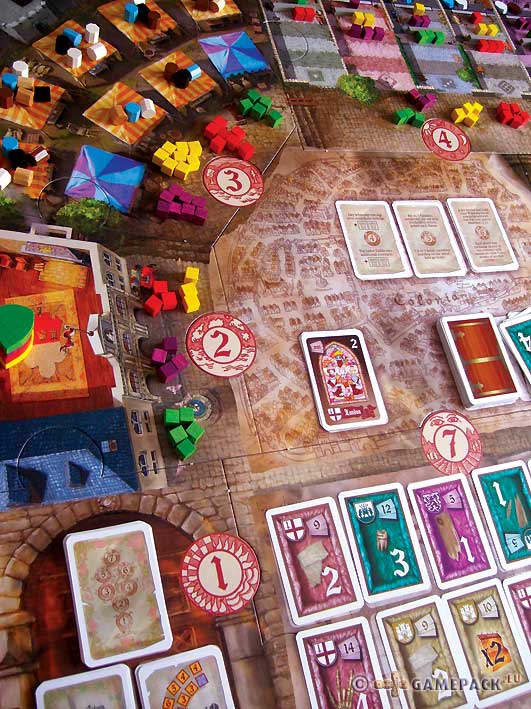 |
| x |
|
|
|
|
|
|
|
|
|
|
|
|
|
|
|
|
|
|
|
|
|
|
|
|
|
|
|
|
|
|
|
|
|
|
|
|
|
|
|
|
|
|
|
|
|
|
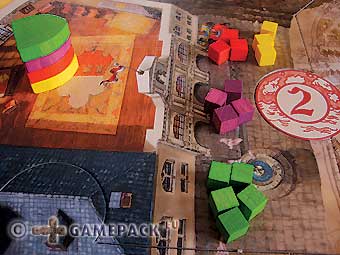 |
|
Each player has a variable amount of family members - in a game of four players, they have 30 members at their disposal - that he can place at the various locations. At the city council players first play a card from their hand to state how much representation they want to take in the council. The player with the most family members becomes the starting player during this week, with other players following according to the amount of their family members. |
|
| x |
|
|
|
|
|
|
|
|
|
|
|
|
|
|
|
|
|
|
|
|
|
|
|
|
|
|
|
|
|
|
|
|
|
|
|
|
|
|
|
|
|
|
|
|
|
|
| Players get their allocated family members on a location/day back only ater the conclusion of that day the following week; placing a lot of members on one location confronts a player with limitations elsewhere. Apart from this a player always is forced to play a family card at the city council, and these card go from value three to eight. So, at one time during the game, the ‘eight’ card has to be played. Those eight family members cannot be allocated at other locations for a full week! |
|
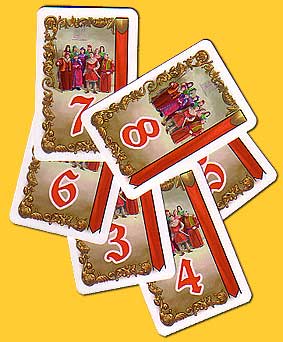 |
|
| x |
|
|
|
|
|
|
|
|
|
|
|
|
|
|
|
|
|
|
|
|
|
|
|
|
|
|
|
|
|
|
|
|
|
|
|
|
|
|
|
|
|
|
|
|
|
|
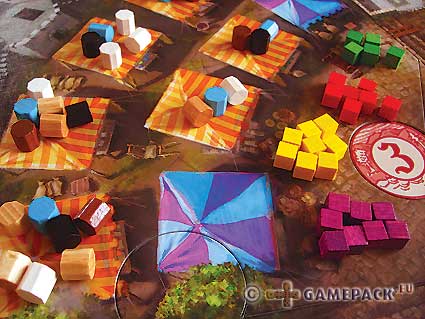 |
|
The player order is important to strike first at the market. Each round a number of resources is drawn from a bag and put at the various market stands. These could be fitting combinations that the craftsmen convert into products, but at other times a player just wants to claim as much resources at once as he can. When he does so, an equal amount of family members is put on the corresponding stand. These members are out shopping and again cannot be used until after the end of the same day the following week. |
|
| x |
|
|
|
|
|
|
|
|
|
|
|
|
|
|
|
|
|
|
|
|
|
|
|
|
|
|
|
|
|
|
|
|
|
|
|
|
|
|
|
|
|
|
|
|
|
|
| At the guilds the allocation of family members is somewhat different: here the first player at a production house ‘pays’ by placing one member here, the second player has to place two members, and so on. At the same time he delivers the needed resources, but has to wait for the delivery of the corresponding products as it is not aforegone conclusion that all products will be produced this week: at the start of the week the production is settled in a ‘Polit Bureau’ like manner, but this can be increased by a die at the end of the allocation phase. Players above the garantee line - a wooden stick - are guaranteed to get their product; for others underneath this line it is an exciting moment when the die is cast - which production house will be allowed for some additional production? |
|
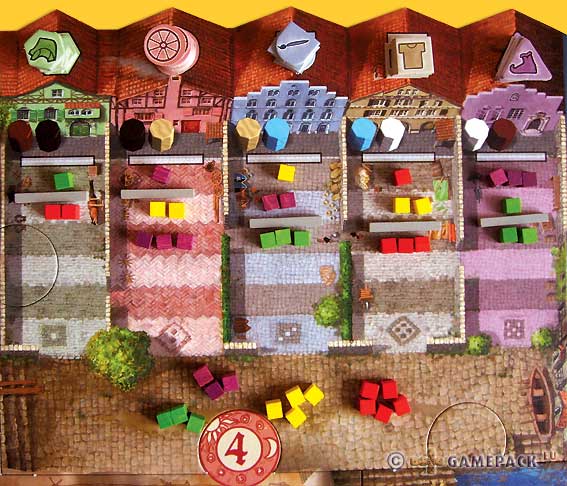 |
| x |
|
|
|
|
|
|
|
|
|
|
|
|
|
|
|
|
|
|
|
|
|
|
|
|
|
|
|
|
|
|
|
|
|
|
|
|
|
|
|
|
|
|
|
|
|
|
 |
|
After this, players walk to the harbour where they place a member/cube on one of the ships to ship their goods. The ships have various compartments on which the reserved space for the goods is preprinted, together with their revenue s. On monday it became known how many of these ships would sail away on this Friday, so it often gets very crowded at the quay for all players to ship their goods. The ships are drawn from a blind stack, and have five different origins that handle as many foreign currencies.
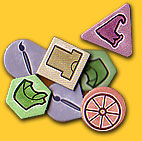 |
|
| x |
|
|
|
|
|
|
|
|
|
|
|
|
|
|
|
|
|
|
|
|
|
|
|
|
|
|
|
|
|
|
|
|
|
|
|
|
|
|
|
|
|
|
|
|
|
|
| This is a bit awkward, especially when players go shopping in the church shop on Sunday where the relicts are on display. In the shop a relict must be paid in one of the five currencies. Fifteen hard earned Bruge guilders then can finally be exchanged for a relict worth five points, if such a relict is on display. |
|
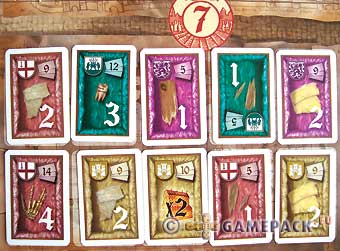 |
|
| x |
|
|
|
|
|
|
|
|
|
|
|
|
|
|
|
|
|
|
|
|
|
|
|
|
|
|
|
|
|
|
|
|
|
|
|
|
|
|
|
|
|
|
|
|
|
|
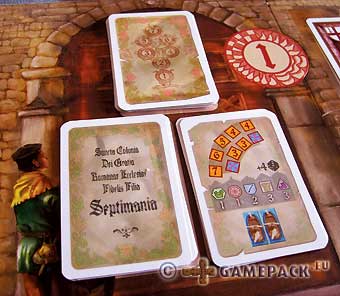 |
|
And on it goes: a new week, and thus a new round. After the sixth week players count the totals of their relicts, after which it becomes clear who had the best family management. |
|
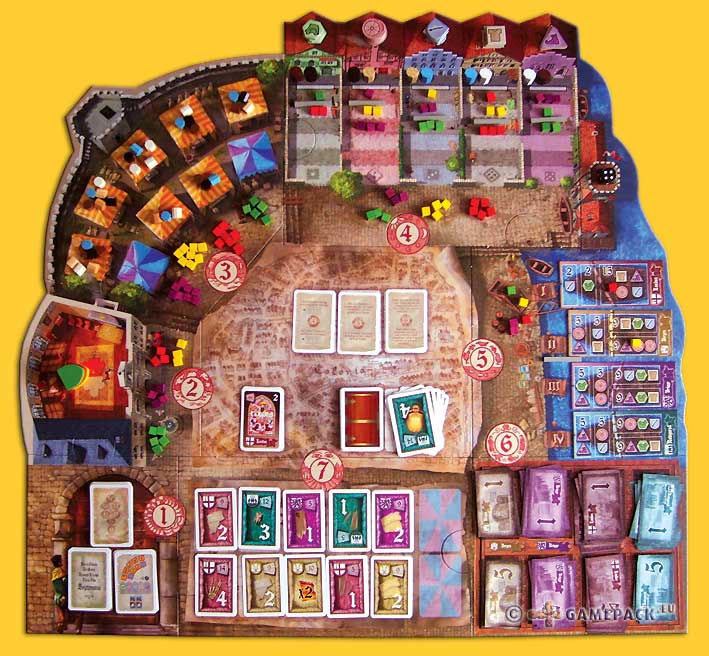 |
| x |
|
|
|
|
|
|
|
|
|
|
|
|
|
|
|
|
|
|
|
|
|
|
|
|
|
|
|
|
|
|
|
|
|
|
|
|
|
|
|
|
|
|
|
|
|
|
| x |
|
|
|
|
|
|
|
|
|
|
|
|
|
|
|
|
|
|
|
|
|
|
|
|
|
|
|
|
|
|
|
|
|
|
|
|
|
|
|
|
|
|
|
|
|
|
 |
|
|
|
|
|
|
|
|
|
|
|
|
|
|
|
|
|
|
|
|
|
|
|
|
|
|
|
|
|
|
|
|
|
|
|
|
|
|
|
|
|
|
Players collect resources they exchange for goods that they exchange for relicts that earn points; may we summarize it this way? Usually in current games the mechanism of collecting points is done in three steps: do this to get that and finally collect the points for it. ‘Colonia’ uses five transitions thereby holding the reward a bit too far from the mouth. This decreases the tension in the game. Planning or development almost is impossible as each phase/day has too many uncertainties or the goal is too far ahead.
‘Colonia’ is a good example too why people want to break out of their daily grind and set out: all days, and all weeks are more or less the same. The game would not become less or more if only two or three weeks would be played.
For the occasional player the game lasts too long and has too many rules; the seasoned player on the other hand finds the game offers not enough challenge and rather spends his time with meatier games of similar game length. |
|
| x |
|
|
|
|
|
|
|
|
|
|
|
|
|
|
|
|
|
|
|
|
|
|
|
|
|
|
|
|
|
|
|
|
|
|
|
|
|
|
|
|
|
|
|
|
|
|
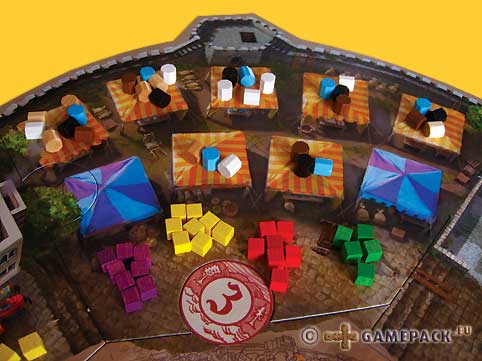 |
|
Yes, the game looks terrific, and the production is excellent. And that placed cubes only become available until after the following week, and not all production houses produce equally, are nice mechanisms and well implemented ideas. |
|
| x |
|
|
|
|
|
|
|
|
|
|
|
|
|
|
|
|
|
|
|
|
|
|
|
|
|
|
|
|
|
|
|
|
|
|
|
|
|
|
|
|
|
|
|
|
|
|
| ‘Colonia’ impresses broadwise, but cannot hide the fact that it has little depth. This is a pity of the effort. A good game has to be simple in the first place: simple in construction, but overwhelming in its possibilities. |
|
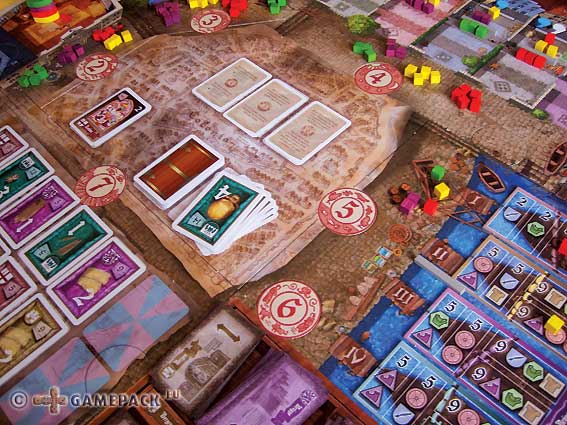 |
| x |
|
|
|
|
|
|
|
|
|
|
|
|
|
|
|
|
|
|
|
|
|
|
|
|
|
|
|
|
|
|
|
|
|
|
|
|
|
|
|
|
|
|
|
|
|
|
‘Colonia’ on the contrary, and I am saying this with reluctance, is an artificial and immature piece of patchwork, not the work of art it pretends to be. The sacred tour starts impressive, but stumbles near the souvenir shop around the corner, thereby failing the intended finish line: the Treasure Room of the Colognian Dome.
© 2010 Richard van Vugt
Colonia, Dirk Henn, Queen Games, 2009 - 3 to 6 players, 12 years and up, 120 minutes
|
|
  |
|
|
|
|
|
|
|
|
|
|
|
|
|
|
|
|
|
|
|
|
|
|
|
|
|
|
|
|
|
|
|
|
|
|
|
|
|
|
|
|
|
|
  |
Rather repetitive, no development |
  |
An unclear exchange game in seven parts |
  |
Each round is the same without any development |
|
|
|
|
|
|
|
|
|
  |
Nice graphics, but the time and time again exchange of card board pieces into other card board pieces soon becomes dull |
|
|
|
|
|
|
|
| x |
|
|
|
|
|
|
|
|
|
|
|
| x |
|
|
|
|
|
|
|
|
|
|
|
|
|
|
|
|
|
|
|
|
|
|
|
|
|
|
|
|
|
|
|
|
|
|
|
|
|
|
|
|
|
|
|
|
|
|
 |
|
|
|
|
|
|
|
|
|
|
|
|
|
|
|
|
|
|
|
|
|
|
|
|
|
|
|
|
|
|
|
|
|
|
|
|
|
|
|
|
|
|
 |
|
|
|
|
|
|
|
|
|
|
|
|
|
|
|
|
|
|
|
|
|
|
|
|
|
|
|
|
|
|
|
|
|
|
|
|
|
|
|
|
|
|
| x |
|
|
|
|
|
|
|
|
|
|
|
|
|
|
|
|
|
|
|
|
|
|
|
|
|
|
|
|
|
|
|
|
|
|
|
|
|
|
|
|
|
|
|
|
|
|
 |
|
|
|
|
|
|
|
|
|
|
|
|
|
|
|
|
|
|
|
|
|
|
|
|
|
|
|
|
|
|
|
|
|
|
 |
|
|
|
|
|
|
|
|
|
|
|
|
|
|
|
|
|
|
|
|
|
|
|
|
|
|
|
|
|
|
|
|
|
|